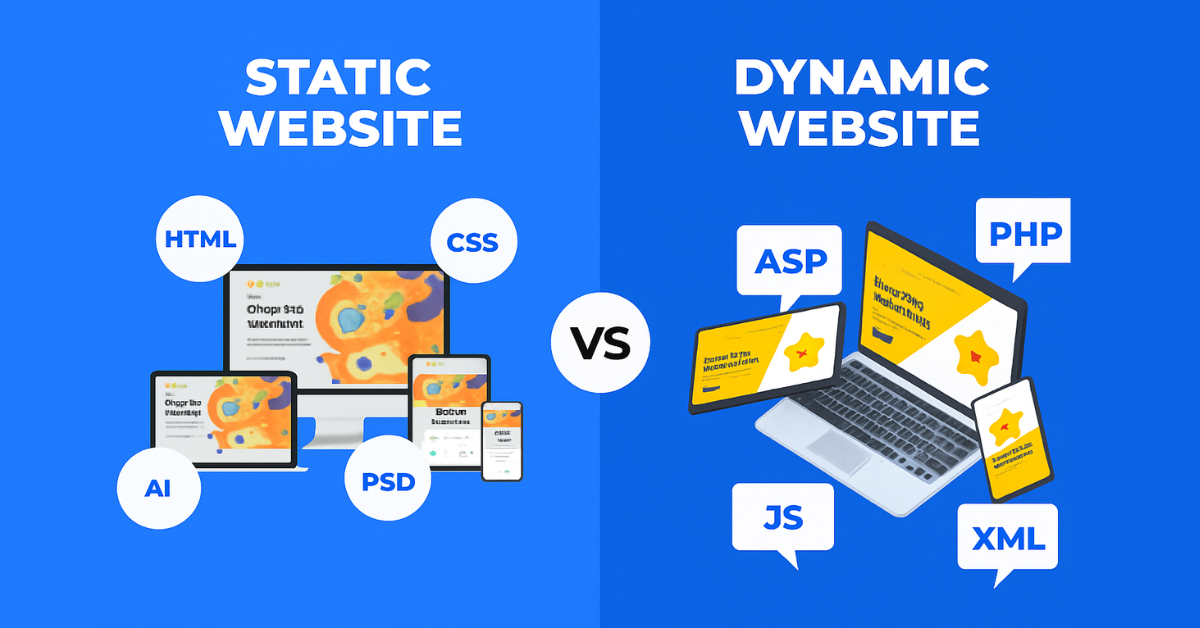Ready to create your first website, but confused by all the tech terminology? You have likely heard the terms’ static vs. dynamic websites,’ but what do they actually mean? This article serves as your guide to understanding the key contrasts and, more notably, helps you decide which type is right for your project. We will break down the pros and cons of each, providing a clear path forward without the confusion. The choice between static and dynamic websites is a foundational conclusion that will have a substantial impact on your site’s performance, security, and future scalability.
What is a Static Website?
A static website is like a digital handout. It is built from a set of pre-made HTML files, CSS stylesheets, and JavaScript. When a user accesses your site, the server sends these pre-made, static files straight to their browser. There’s no on-the-fly content creation or interaction with a database. This is why static websites are known for their amazing speed and clarity. They are also highly secure and affordable, but require manual updates to the code for any changes, making them best for sites with fixed content
What is a Dynamic Website?
A dynamic website is a bustling, interactive hub. Instead of serving pre-made files, the server builds each page in real-time based on a user’s request, pulling content from a database. This constant communication makes dynamic sites very powerful and flexible. They use a Content Management System (CMS) like WordPress, allowing for easy updates and rich functionality such as e-commerce, user accounts, and forums. However, this flexibility comes with a trade-off: they are generally slower, have higher security risks, and are more complex to host and maintain. This is the root issue when deciding between static and dynamic websites.
The Side-by-Side Showdown

To make your decision easier, let’s put these two competitors in the ring for a head-to-head comparison. This comparison will highlight why the discussion between static and dynamic websites is crucial for different types of projects.
Speed & Performance: The Race to the Finish
- Static Websites: These are the clear winners in the speed category. Since their files are pre-built and ready to be served instantly, they offer a lightning-fast user experience. This rapid loading is not only great for visitors but also gives a significant boost to your site’s SEO ranking.
- Dynamic Websites: These are a bit slower. Because the server has to perform processing and query a database for every page load, there’s a slight delay before the page is fully rendered.
Security: Fortresses vs. Open Gates
- Static Websites: These are like a fortified structure, fixed and reliable. Their simpler architecture and lack of a database mean they have far fewer entry points for attackers, making them far more secure from common hazards.
- Dynamic Websites: These have more safety challenges. Their reliance on server-side scripts and databases creates more possible vulnerabilities that require constant attention and updates to protect against threats.
Content Management: Effortless vs. Hands-On
- Static Websites: Organizing content can be a bit of a hands-on process. You either have to manually revise the source code or use a static site generator, which can be bulky if you are not technically inclined.
- Dynamic Websites: This is where they truly shine. A Content Management System (CMS) gives you an easy-to-use dashboard to manage and update all your content effortlessly, no coding required.
Cost: Budget-Friendly vs. Premium
- Static Websites: These are generally more budget-friendly. Their simple architecture means they require minimal server help, resulting in lower development and hosting costs.
- Dynamic Websites: These are the more excellent options. They require more robust hosting and are more complex to build initially, leading to higher overall costs.
Making the Right Choice for Your Project
The winner of this showdown is not a single website type; it is the one that best fits your specific needs. The ongoing discussion about static and dynamic websites is not about which is naturally superior, but about aligning technology with business goals.
- Choose a Static Website if: you need a simple portfolio, a personal resume site, a small business brochure site, or a landing page. Your content is fixed, and speed and security are your top priorities.
- Choose a Dynamic Website if: you are building a blog, an e-commerce store, a social media platform, a forum, or any site that requires user interaction and frequent content updates. You need the power of a CMS and the flexibility to grow.
Conclusion
The final decision between static and dynamic websites is a vital one, and it all depends on your specific needs. Static sites are the perfect option for projects focused on speed, security, and simplicity, such as portfolios or brochure sites. Contrarily, dynamic websites are the best option for projects that require flexibility, frequent updates, and complex functionality like blogs or online stores.
Finally, your website should be a tool that helps you achieve your business goals. For a smart, effective online presence that is built to last, a careful review of your purpose and plans is essential. If you are still unsure which path to take, our expert team can help. As a leading web design company, we provide professional advice to ensure your website is built on a solid foundation for your success.

Leave a Reply